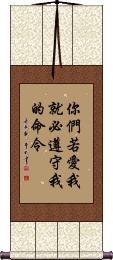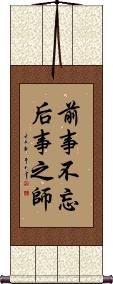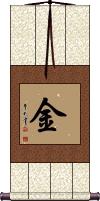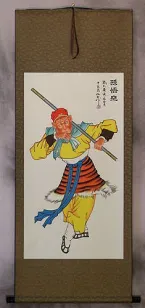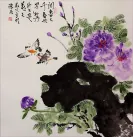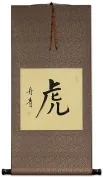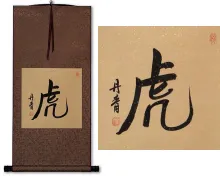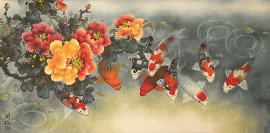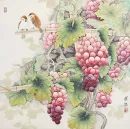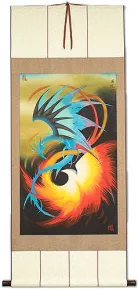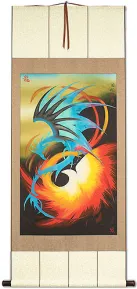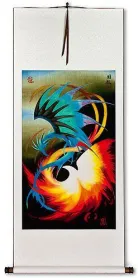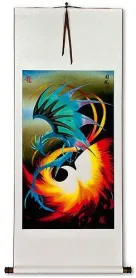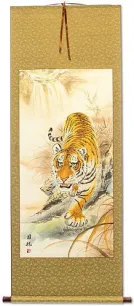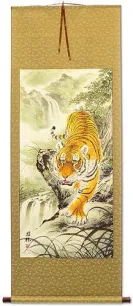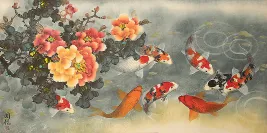Many custom options...
And formats...

The name My King in Chinese / Japanese...
Buy a My King calligraphy wall scroll here!
Personalize your custom “My King” project by clicking the button next to your favorite “My King” title below...
1. The one who retreats 50 paces mocks the one to retreats 100
2. John 14:15
3. Past experience is the teacher for the future
4. Tiger Rumor
5. Unselfish: Perfectly Impartial
6. King
The one who retreats 50 paces mocks the one to retreats 100
The pot calls the kettle black
五十步笑百步 is a Chinese proverb that means the one who retreats 50 paces mocks the one who retreats 100 paces.
During the Warring States Period of what is now China (475 - 221 B.C.), the King of Wei was in love with war. He often fought with other kingdoms just for spite or fun.
One day, the King of Wei asked the philosopher Mencius, “I love my people, and all say I do the best for them. I move the people from famine-stricken areas to places of plenty and transport grains from rich areas to the poor. Nobody goes hungry in my kingdom, and I treat my people far better than other kings. But why does the population of my kingdom not increase, and why does the population of other kingdoms not decrease?”
Mencius answered, “Since you love war, I will make this example: When going to war, and the drums beat to start the attack, some soldiers flee for their lives in fear. Some run 100 paces in retreat, and others run 50 steps. Then the ones who retreated 50 paces laugh and taunt those who retreated 100 paces, calling them cowards mortally afraid of death. Do you think this is reasonable?
The King of Wei answered, “Of course not! Those who run 50 paces are just as timid as those who run 100 paces.”
Mencius then said, “You are a king who treats his subjects better than other kings treat their people, but you are so fond of war that your people suffer from great losses in battle. Therefore, your population does not grow. While other kings allow their people to starve to death, you send your people to die in war. Is there any difference?”
This famous conversation led to the six-character proverb shown here. It serves as a warning to avoid hypocrisy. It goes hand-in-hand with the western phrase, “The pot calls the kettle black,” or the Biblical phrase, “Before trying to remove a splinter from your neighbor's eye, first remove the plank from your own eye.”
John 14:15
你們若愛我就必遵守我的命令 is the translation of John 14:15 into Chinese.
This comes from the Chinese Union Bible which comes from a revised King James version. This Chinese Bible was originally translated and printed in 1919 (several revisions since then).
Because of the origin being the KJV, I'll say that in English, this would be, “If ye love me, keep my commandments...”
In basic English, this would be, “If you have love for me, you will keep my laws.”
Past experience is the teacher for the future
Past events not forgotten serve as teachers for later events.
The most literal translation to English of this ancient 前事不忘后事之师 Chinese proverb is:
“Past events not forgotten serve as teachers for later events.”
However, it's been translated several ways:
Don't forget past events, they can guide you in the future.
Benefit from past experience.
Past experience, if not forgotten, is a guide for the future.
Past calamity is my teacher.
A good memory for the past is a teacher for the future.
The remembrance of the past is the teacher of the future.
If one remembers the lessons of the past; They will serve as a guide to avoid mistakes in the future.
The origin:
This proverb comes from the 5th century B.C., just before the Warring States Period in the territory now known as China.
The head of the State of Jin, Zhi Bo, seized power in a coup. He did this with help from the armies of the State of Han and Wei. Instead of being grateful for the help from Han and Wei, he treacherously took the land of Han and Wei. Never satisfied, Zhi Bo employed the armies of Han and Wei to attack and seize the State of Zhao.
The king of Zhao took advice from his minister Zhang Mengtan and secretly contacted the Han and Wei armies to reverse their plans and attack the army of Zhi Bo instead. The plan was successful, and the State of Zhao was not only saved but was set to become a powerful kingdom in the region.
Zhang Mengtan immediately submitted his resignation to a confused king of Zhao. When asked why, Zhang Mengtan said, “I've done my duty to save my kingdom, but looking back at past experience, I know sovereign kings are never satisfied with the power or land at hand. They will join others and fight for more power and more land. I must learn from past experiences, as those experiences are the teachers of future events.”
The king could not dispute the logic in that statement and accepted Zhang Mengtan's resignation.
For generations, the State of Zhao continued to fight for power and land until finally defeated and decimated by the State of Qin (which led to the birth of the Qin Dynasty in 221 B.C.).
Tiger Rumor
These four characters together relay the meaning that can be expressed in English as “When three people say there's a tiger running in the street, you believe it.”
Of course, there is an ancient story behind this idiom...
三人成虎 is actually a proverb that resulted from a conversation that occurred around 300 B.C.
The conversation was between the king of the Wei kingdom and one of the king's ministers named Pang Cong.
It was near the end of one of many wars, this time with the Zhao kingdom. Pang Cong was to be sent by the king to the Zhao kingdom with the king's son, who was to be held hostage. It was common at the time for a king to make his son a hostage to secure stable peace between warring kingdoms.
Before minister Pang Cong departed, he asked his king, “If one person told you a tiger was running in the street, would you believe it?.”
“No,” the king said.
The minister continued, “What if two people told you?”
The king replied, “Well, I would have my doubts but I might believe it.”
The minister continued, “So, what if three people told you that a tiger is running in the streets?”
The king replied, “Yes, I would believe it. It must be true if three people say it.”
The minister then reminded the king, “Your son and I are now traveling far away to live in the distant Zhao kingdom - much farther from your palace than the street. Rumors may fly about me in my absence, so I hope your majesty will weight such rumors appropriately.”
The king replied, “I have every trust in you, do not worry”
While the minister was gone, the king's enemies gossiped about minister Pang Cong on many occasions. At first, the king thought nothing of these comments and rumors. But slowly, as the rumors mounted, the king began to suspect ill of his minister.
Sometime later, when peace was well-established, the minister and prince were freed and returned to the kingdom of Wei. The king received his son BUT DID NOT EVEN SUMMON MINISTER PANG CONG TO THE PALACE!
Hopefully, this story will help you see how dangerous words can be when used to promote rumors or create ill will. And perhaps will inspire you not to believe everything you hear.
There is also a secondary suggestion in this idiom that gossip is as ferocious as a tiger. Some Chinese people who don't know the ancient story above may believe that this scroll means that rumors are as vicious as three tigers.
Note: This proverb appears in my Korean dictionary but is not well-known in Korea.
Unselfish: Perfectly Impartial
大公無私 is a Chinese proverb that comes from an old story from some time before 476 BC. About a man named Qi Huangyang, who was commissioned by the king to select the best person for a certain job in the Imperial Court.
Qi Huangyang selected his enemy for the job. The king was very confused by the selection, but Qi Huangyang explained that he was asked to find the best person for the job, not necessarily someone that he liked or had a friendship with.
Later, Confucius commented on how unselfish and impartial Qi Huangyang was by saying, “Da Gong Wu Si” which, if you look it up in a Chinese dictionary, is generally translated as “Unselfish” or “Just and Fair.”
If you translate each character, you'd have something like
“Big/Deep Justice Without Self.”
Direct translations like this leave out a lot of what the Chinese characters really say. Use your imagination, and suddenly you realize that “without self” means “without thinking about yourself in the decision” - together, these two words mean “unselfish.” The first two characters serve to drive the point home that we are talking about a concept that is similar to “blind justice.”
One of my Chinese-English dictionaries translates this simply as “just and fair.” So that is the short and simple version.
Note: This can be pronounced in Korean, but it's not a commonly used term.
See Also: Selflessness | Work Unselfishly for the Common Good | Altruism
King
金 is how the name King is transliterated into Mandarin Chinese.
The meaning of this character is metal or gold, and it only vaguely sounds like “king”. But it was used in many articles for famous people like Larry King. If my last name was “King”, I would rather use the character 王 which means king, and romanizes as “wang” or “wong.”
This in-stock artwork might be what you are looking for, and ships right away...
Gallery Price: $286.00
Your Price: $158.88
Gallery Price: $65.00
Your Price: $39.88
Gallery Price: $65.00
Your Price: $39.88
Not the results for my king that you were looking for?
Below are some entries from our dictionary that may match your my king search...
| Characters If shown, 2nd row is Simp. Chinese |
Pronunciation Romanization |
Simple Dictionary Definition |
力 see styles |
lì li4 li ryoku りょく |
More info & calligraphy: Power / Strength(suffix) strength; power; proficiency; ability; (given name) Riki bala; power, strength, of which there are several categories: 二力 power of choice and of practice; 三力 the power of Buddha; of meditation (samādhi) and of practice. 五力 pañcabala, the five powers of faith, zeal, memory (or remembering), meditation, and wisdom. 六力 A child's power is in crying; a woman's in resentment; a king's in domineering; an arhat's in zeal (or progress); a Buddha's in mercy; and a bhikṣu's in endurance (of despite) . 十力 q.v. The ten powers of Buddhas and bodhisattvas. |
牛 see styles |
niú niu2 niu ushi(p); gyuu; ushi / ushi(p); gyu; ushi うし(P); ぎゅう; ウシ |
More info & calligraphy: Ox / Bull / Cow(1) cattle (Bos taurus); cow; bull; ox; calf; (2) {food} (usu. ぎゅう) (See 牛肉) beef; (3) (ぎゅう only) {astron} (See 二十八宿,玄武・げんぶ・2) Chinese "Ox" constellation (one of the 28 mansions); (surname) Niu go, gaus; ox, bull, bullock, etc. A term applied to the Buddha Gautama as in 牛王 king of bulls, possibly because of the derivation of his name; the phrase 騎牛來牛 (or 騎牛覔牛) to ride an ox, to seek an ox, means to use the Buddha to find the Buddha. |
玉 see styles |
yù yu4 yü gyoku ぎょく |
More info & calligraphy: Jade(1) (also formerly read as ごく) precious stone (esp. jade); (2) {food} (occ. ギョク) egg (sometimes esp. as a sushi topping); (3) stock or security being traded; product being bought or sold; (4) (See 建玉) position (in finance, the amount of a security either owned or owed by an investor or dealer); (5) geisha; (6) (abbreviation) (See 玉代) time charge for a geisha; (7) (abbreviation) {shogi} (See 玉将) king (of the junior player); (female given name) Hikaru Jade, a gem; jade-like, precious; you, your. |
王 see styles |
wàng wang4 wang ou / o おう |
More info & calligraphy: King(n,n-suf) (1) king; ruler; sovereign; monarch; (n,n-suf) (2) tycoon; magnate; champion; master; (n,n-suf) (3) (abbreviation) {shogi} (See 王将・おうしょう・1) king (of the senior player); (surname) Wan rāja, king, prince, royal; to rule. |
索 see styles |
suǒ suo3 so soo; sou / soo; so ソー; ソウ |
More info & calligraphy: Soe(counter) {mahj} counter for bamboo tiles; (given name) Saku Cord; to extort, express; the cord or noose of Guanyin by which she binds the good; the cord of the vajra-king by which he binds the evil; translit. sa. |
亞哈 亚哈 see styles |
yà hā ya4 ha1 ya ha |
More info & calligraphy: Yayha |
力士 see styles |
lì shì li4 shi4 li shih rikishi(p); rikiji(ok) りきし(P); りきじ(ok) |
More info & calligraphy: Sumo Wrestler(1) {sumo} sumo wrestler; rikishi; (2) strong man; (3) (abbreviation) {Buddh} (See 金剛力士) Deva king; (surname) Rikishi 力者 vīra. A strong or mighty man, hero, demigod. Used for the Licchavi, also 離車; 梨車 (or 黎車); 栗呫媻. The terms 力士城 and 力士生地 are defined as Kuśinagara. |
四大 see styles |
sì dà si4 da4 ssu ta shidai しだい |
More info & calligraphy: Shidai / Sida / Mahabhuta(1) {Buddh} the four elements (earth, water, fire, wind); (2) the human body; (3) Tao, heaven, earth and king mahābhūta, 四界; 四大界. The four elements of which all things are made; or the four realms; i. e. earth, water, fire, and wind (or air); they represent 堅, 濕, 煖, and 動 solid, liquid, heat, and motion; motion produces and maintains life. As 實 active or formative forces they are styled 四界 (四大界) ; as 假 passive or material objects they are 四大; but the 成實論 Satyasiddhi śāstra disputes the 實 and recognizes only the 假. |
天皇 see styles |
tiān huáng tian1 huang2 t`ien huang tien huang tennou / tenno てんのう |
More info & calligraphy: Emperor of JapanEmperor of Japan; (place-name) Tennou Deva-king; the Tang monk 道悟 Daowu of the 天皇 Tianhuang monastery at 荊州 Jingzhou. |
夫人 see styles |
fū ren fu1 ren5 fu jen fujin(p); bunin(ok); hashikashi(ok) ふじん(P); ぶにん(ok); はしかし(ok) |
More info & calligraphy: Fujin(1) (ふじん, はしかし only) (honorific or respectful language) wife; Mrs; madam; (2) (ふじん only) (archaism) wife of a nobleman (aristocrat, etc.); (3) (ふじん, ぶにん only) (archaism) consort of the emperor A wife; the wife of a king, i. e. a queen, devi. |
悟空 see styles |
wù kōng wu4 kong1 wu k`ung wu kung gokuu / goku ごくう |
More info & calligraphy: Wukong / Goku(surname, given name) Gokuu |
猴王 see styles |
hóu wáng hou2 wang2 hou wang |
More info & calligraphy: Monkey King |
王子 see styles |
wáng zǐ wang2 zi3 wang tzu ouji / oji おうじ |
More info & calligraphy: Prince(1) prince; (2) subordinate Kumano shrine; (female given name) Kimiko prince |
萬歲 万岁 see styles |
wàn suì wan4 sui4 wan sui |
More info & calligraphy: Banzai / Wansui |
西施 see styles |
xī shī xi1 shi1 hsi shih seishi / seshi せいし |
More info & calligraphy: Xishi / Xi Shi(personal name) Seishi |
龍神 龙神 see styles |
lóng shén long2 shen2 lung shen ryuujin / ryujin りゅうじん |
More info & calligraphy: Dragon SpiritA dragon-god, or spirit. |
キンク see styles |
kingu キング |
king; (personal name) King |
サウル see styles |
sauru サウル |
More info & calligraphy: Saul |
孫悟空 孙悟空 see styles |
sūn wù kōng sun1 wu4 kong1 sun wu k`ung sun wu kung songokuu / songoku そんごくう |
More info & calligraphy: Sun Wukong / Son Goku(1) (char) Sun Wukong (character in the classic Chinese novel Journey to the West); Monkey King; (2) (char) Son Goku (Dragon Ball); (ch) Sun Wukong (character in the classic Chinese novel Journey to the West); Monkey King; (ch) Son Goku (Dragon Ball) |
法魯克 法鲁克 see styles |
fǎ lǔ kè fa3 lu3 ke4 fa lu k`o fa lu ko |
More info & calligraphy: Faruq |
約西亞 约西亚 see styles |
yuē xī yà yue1 xi1 ya4 yüeh hsi ya |
More info & calligraphy: Josiah |
觀世音 观世音 see styles |
guān shì yīn guan1 shi4 yin1 kuan shih yin Kanzeon かんぜおん |
More info & calligraphy: Guan Shi Yin: Protector Of Life(out-dated kanji) Avalokiteshvara (Bodhisattva); Avalokitesvara; Kannon; Kwannon; Guanyin; Buddhist deity of compassion Regarder of the world's sounds, or cries, the so-called Goddess of Mercy; also known as 觀音; 觀世音善薩; 觀自在 (觀世自在); 觀尹; 光世音 (the last being the older form). Avalokiteśvara, v. 阿 8. Originally represented as a male, the images are now generally those of a female figure. The meaning of the term is in doubt; it is intp. as above, but the term 觀自在 (觀世自在) accords with the idea of Sovereign Regarder and is not associated with sounds or cries. Guanyin is one of the triad of Amida, is represented on his left, and is also represented as crowned with Amida; but there are as many as thirty-three different forms of Guanyin, sometimes with a bird, a vase, a willow wand, a pearl, a 'thousand' eyes and hands, etc., and, when as bestower of children, carrying a child. The island of Putuo (Potala) is the chief centre of Guanyin worship, where she is the protector of all in distress, especially of those who go to sea. There are many sūtras, etc., devoted to the cult, but its provenance and the date of its introduction to China are still in doubt. Chapter 25 of the Lotus Sūtra is devoted to Guanyin, and is the principal scripture of the cult; its date is uncertain. Guanyin is sometimes confounded with Amitābha and Maitreya. She is said to be the daughter of king Śubhavyūha 妙莊王, who had her killed by 'stifling because the sword of the executioner broke without hurting her. Her spirit went to hell; but hell changed into paradise. Yama sent her back to life to save his hell, when she was miraculously transported on a Lotus flower to the island of Poo-too'. Eitel. |
不動明王 不动明王 see styles |
bù dòng míng wáng bu4 dong4 ming2 wang2 pu tung ming wang fudoumyouou / fudomyoo ふどうみょうおう |
More info & calligraphy: Fudo Myo-o / Wisdom King不動尊 Aryacalanatha 阿奢羅曩 tr. 不動尊 and 無動尊 and Acalaceta, 阿奢囉逝吒 tr. 不動使者. The mouthpiece or messenger, e. g. the Mercury, of the Buddhas; and the chief of the five Ming Wang. He is regarded as the third person in the Vairocana trinity. He has a fierce mien overawing all evil spirits. He is said to have attained to Buddhahood, but also still to retain his position with Vairocana. He has many descriptive titles, e. g. 無量力神通無動者; 不動忿怒王, etc. Five different verbal signs are given to him. He carries a sharp wisdom-sword, a noose, a thunder-bolt. The colour of his images is various—black, blue, purple. He has a youthful appearance; his hair falls over his left shoulder; he stands or sits on a rock; left eye closed; mouth shut, teeth gripping upper lip, wrinkled forehead, seven locks of hair, full-bodied, A second representation is with four faces and four arms, angry mien, protruding teeth, with fames around him. A third with necklaces. A fourth, red, seated on a rock, fames, trident, etc. There are other forms. He has fourteen distinguishing symbols, and many dharanis associated with the realm of fire, of saving those in distress, and of wisdom. He has two messengers 二童子 Kimkara 矜羯羅 and Cetaka 制吒迦, and, including these, a group of eight messengers 八大童子 each with image, symbol, word-sign, etc. Cf. 不動佛. |
摩賀羅惹 摩贺罗惹 see styles |
mó hè luó rě mo2 he4 luo2 re3 mo ho lo je magaraja |
More info & calligraphy: Maharaja |
□ see styles |
ging ging1 ging |
uptight; obstinate; to awkwardly force oneself to do something (from Taiwanese, Tai-lo pr. [king], often written as ㄍㄧㄥ, no generally accepted hanzi form) |
仕 see styles |
shì shi4 shih shi し |
to serve as an official; an official; the two chess pieces in Chinese chess guarding the "general" or "king" 將|将[jiang4] official; civil service; (given name) Tsukou |
崩 see styles |
bēng beng1 peng nadare なだれ |
to collapse; to fall into ruins; death of king or emperor; demise (female given name) Nadare |
帥 帅 see styles |
shuài shuai4 shuai sochi; sotsu そち; そつ |
(bound form) commander-in-chief; (bound form) to lead; to command; handsome; graceful; dashing; elegant; (coll.) cool!; sweet!; (Chinese chess) general (on the red side, equivalent to a king in Western chess) (See 大宰府) director of the Dazaifu; (given name) Tsukasa |
朕 see styles |
zhèn zhen4 chen chin ちん |
(used by an emperor or king) I; me; we (royal "we"); (literary) omen (pronoun) (dated) (first person pronoun used by the Emperor) We |
龗 see styles |
okami おかみ |
(rare) water god; rain and snow god; dragon god; dragon king |
Click here for more my king results from our dictionary
The following table may be helpful for those studying Chinese or Japanese...
| Title | Characters | Romaji (Romanized Japanese) | Various forms of Romanized Chinese | |
| The one who retreats 50 paces mocks the one to retreats 100 | 五十步笑百步 | wù shí bù xiào bǎi bù wu4 shi2 bu4 xiao4 bai3 bu4 wu shi bu xiao bai bu wushibuxiaobaibu | wu shih pu hsiao pai pu wushihpuhsiaopaipu |
|
| John 14:15 | 你們若愛我就必遵守我的命令 你们若爱我就必遵守我的命令 | nǐ mén ruò ài wǒ jiù bì zūn shǒu wǒ de mìng lìng ni3 men2 ruo4 ai4 wo3 jiu4 bi4 zun1 shou3 wo3 de ming4 ling4 ni men ruo ai wo jiu bi zun shou wo de ming ling | ni men jo ai wo chiu pi tsun shou wo te ming ling | |
| Past experience is the teacher for the future | 前事不忘后事之師 前事不忘后事之师 | qián shì bú wàng hòu shí zhī shī qian2 shi4 bu2 wang4 hou4 shi2 zhi1 shi1 qian shi bu wang hou shi zhi shi | ch`ien shih pu wang hou shih chih shih chien shih pu wang hou shih chih shih |
|
| Tiger Rumor | 三人成虎 | sān rén chéng hǔ san1 ren2 cheng2 hu3 san ren cheng hu sanrenchenghu | san jen ch`eng hu sanjenchenghu san jen cheng hu |
|
| Unselfish: Perfectly Impartial | 大公無私 大公无私 | dà gōng wú sī da4 gong1 wu2 si1 da gong wu si dagongwusi | ta kung wu ssu takungwussu |
|
| King | 金 | jīn / jin1 / jin | chin | |
| In some entries above you will see that characters have different versions above and below a line. In these cases, the characters above the line are Traditional Chinese, while the ones below are Simplified Chinese. | ||||
Successful Chinese Character and Japanese Kanji calligraphy searches within the last few hours...

